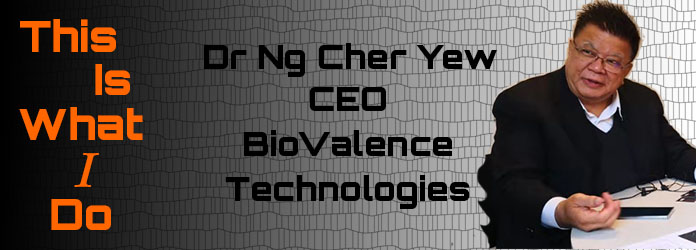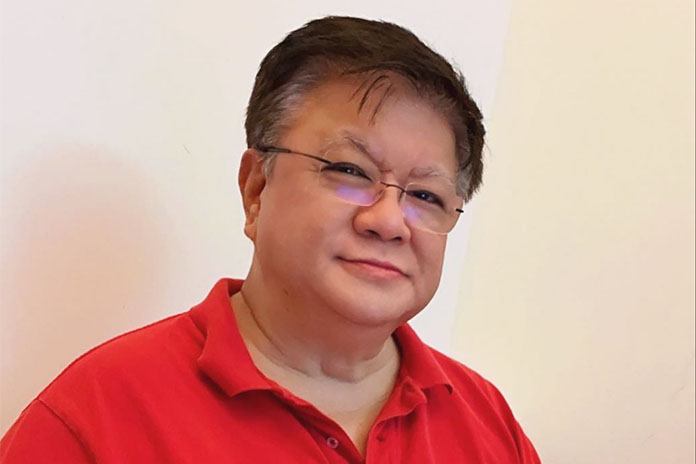
IF Dr Ng Cher Yew could get access to the SARS-CoV-2 virus and a lab to test his RetroMAD1 molecule, he believes we could be closer to finding a treatment and cure for Covid-19.
His company, BioValence Technologies, commercialised the first molecule, RetroMAD1 (a combination of the 3 peptide domains — RETROcyclin, Map30 and Dermaseptin-1) for the pet market to good effect. Its effectiveness in treating Feline Infectious Peritonitis (FIP) also opens up an opportunity to bring this antiviral into the fight against Covid-19.
As SARS-CoV-2 shares the same mechanism of entry into cells as HIV, Ebola, Dengue and FIP, Dr Ng is confident that RetroMAD1 could prove as effective against Covid-19. He just needs to verify this.
However, Dr Ng is caught in a conundrum that currently exists in the area of drug manufacturing. Big pharmaceutical firms with the means are not eager to enter this space, as it’s not as profitable as finding solutions for chronic conditions since there isn’t long-term value to be enjoyed. And the public research facilities are challenged by the lack of funding, and are often at the mercy of institutions and politics.
BioValence Technologies is looking for a lab to run the tests, and a source of the virus to work on, but most facilities are currently tied up with their own research, many with repurposed drugs.
“We have interest from overseas facilities, but we are lamenting that no local institution has been willing to lend support,” Dr Ng states.
A Colombo Plan scholar with degrees in Bachelor of Science and Bachelor of Veterinary Medicine & Surgery from Murdoch University, Australia, Dr Ng was part of the corporate team at the Agri-Food & Veterinary Authority (AVA) in Singapore before joining Belgian chemical company Solvay.
He spotted an opportunity with BioValence Sdn Bhd, when he was running Oceanus Group, and looking for a solution to produce pathogen free prawns. When the company fell into financial difficulties, he took over majority equity, in 2017, under the Singapore-registered BioValence Technologies.
As an entrepreneur, Dr Ng brings his knowledge of science and business together. Running his own business is not easy. “As an entrepreneur, knowing how to raise funds is a much-needed skill,” he points out.
He talks to STORM-ASIA about what he does.
STORM-ASIA: How close are you to finding a treatment for Covid-19?
DR NG: We have a unique drug. Today most of the trial studies for a cure are on repurposed drugs, eg the HIV drugs, but the ones being tested needed to be given intravenously and therefore requires hospitalisation. Ours can be given orally, so can be taken immediately by patients tested positive or with initial symptoms. It can also be taken preventively by those who may have come into close contact with Covid positive people.
Even if a vaccine is ready for commercial use now, they would not be effective for patients that are already infected. Vaccines can also not guarantee that they will be effective against the next episode of Coronavirus given the likelihood to mutate easily. SARS vaccines developed during the SARS episode are of no use to the current situation.
As our drug works on a molecular level, it will be effective even if the corona virus mutates, so we will continue to pursue the course of action to its end, provided we continue to be well funded.
In essence, RetroMAD1 does not compete with the current research in a Covid-19 treatment drug and vaccine. It actually complements the current research as there is a gap to fill in the medicalization of the population against Covid-19.
An in-vitro study, which is relatively inexpensive to perform, would confirm our molecule as a potential for treating Covid-19. It is a very safe protein and can be taken orally, thereby allowing treatment on a large scale and for prophylaxis, or preventive treatment.
STORM-ASIA: What are the processes involved in reaching an acceptable outcome?
DR NG: Given the urgency for global leaders to find a vaccine or a cure for Covid-19, regulatory steps would have to be shortened. We have been asked by a European pharma to join them to contribute to the European Innovative Medicine Initiative (IMI), a consortium working towards this end.
ALSO READ: Support The Local Farmers
At the least, 4 steps are required — an in-vitro test, animal challenge study, a clinical human safety, and efficacy trial — before the drug can be endorsed for human use. The trials or studies can be quite fast if regulatory approval can be hastened. The IMI consortium has the means to do all these tests, and if they like our drug after review, we believe we can be a noteworthy candidate. While we are waiting for them to organise themselves, we are getting the in-vitro test done at our cost and the results would help the consortium or other potential partners come to a decision.
STORM-ASIA: What are your thoughts on the conflicting viewpoints that have emerged around Covid-19; the wearing of masks, the phased lockdown, the herd immunity approach…?
DR NG: The Covid-19 virus is very infectious, unlike the SARS virus, and is quite hardy, which means it can stay on certain surfaces from a day to a week or more. The debated approach is whether to isolate the infected away from the un-infected population or a retarded infection of the entire population, what we call herd or population immunity.
If you choose the former approach, you need to be aggressive like what was done in China to contain the infected community from spreading to other non-infected communities, so lockdown, control of human movements, wearing of masks, social distancing, no gathering of people in large groups etc., would need to be instituted.
The latter approach is more controversial as you still allow communities to mingle but observe basic hygiene practices and social distancing, allowing the virus to spread more slowly across the population. However, those that fall sick and require medical attention may overwhelm the medical support system. The latter approach is more acceptable if you have a cure at hand.
STORM-ASIA: How do we prevent another pandemic? Is it possible? Are there standard operating procedures (SOPs) that could be introduced based on lessons learnt from this current episode?
DR NG: You can learn how to deal with another pandemic from the experiences of this episode, but you cannot prevent another pandemic. One does not know how the Coronavirus mutates and when or where it may break out next.
With today’s world of easy travel and intermingling, spread is relatively easy.
The government can develop SOPs based on lessons learnt from this episode — stockpiling of masks, ventilators, movement control and so on.
STORM-ASIA: How competitive is the Life Sciences field?
DR NG: In Biotech, discovering a novel antiviral drug molecule is a long, arduous process of trial and error; selecting from over tens if not hundreds of molecules and their combinations with potential antiviral properties, reviewing past and current research works to narrow down the numbers.
Up to this point in the screening process where 80% failure rate is expected, the work is very competitive, and most biotech companies pretty much follow this process given that costs up to this stage are not so prohibitive.
ALSO READ: Watch Out For Virtual And Real-World COVID-19 Threats
In the case of BioValence Technologies, we have passed the screening process and the molecules have been identified and synthesised. The chosen molecules are thereafter subject to various in-vitro studies using a variety of cell lines infected with the viruses the researchers are targeting and animal challenge models if the cell line studies show potential.
The costs here can be prohibitive, and the competition lessens, given that one needs to have good laboratory facilities certified for certain biohazard works, with specialised research staff.
If the drug shows good antiviral potential after this battery of tests, the strategy would be to quickly take up a patent on it and publish the work thereafter. The selected few drugs that make it past this stage will continue on to costly clinical studies, where the drug would be unique to you.
STORM-ASIA: What areas will BioValence focus on?
DR NG: We are a small start-up with a limited budget. We are focusing to commercialise the first molecule, RetroMAD1, for the pet market.
The other part of our work is to seek partnership for human applications where our previous work on in vitro and animal in vivo studies have shown potential to develop these applications.
STORM-ASIA: How did your previous stints with AVA and Solvay help in defining your business and its operations?
DR NG: With AVA, I learnt to appreciate how government works and this helps understanding registration and other regulatory requirements to commercialise a biotech product.
At Solvay, I was involved in managing distributors and responsible for sales in my markets which are also important business skills to acquire.
After Solvay, I started my own small businesses and the experiences I acquired are essential to survive as an entrepreneur. In biotech, you have to be in for the long haul and there would be times of uncertainty as your discoveries find little interest from big pharma or investors, but you have to continue to believe in yourself and do more studies to prove the worthiness of your discovery before attracting some interests from the big boys.
It needs lots of guts, and I would say there is never a dull moment.
This Is What I Do is a new series of discussions with people from all walks of life who share their insights and understanding of how they view the world. If you believe you have something to share, do let us know. Email editor@storm-asia.com with a brief description and contact details.





















